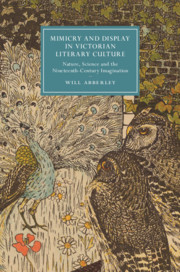 Mimicry and Display in Victorian Literary Culture
Mimicry and Display in Victorian Literary Culture Book contents
- Mimicry and Display in Victorian Literary Culture
- Cambridge Studies in Nineteenth-Century
- Mimicry and Display in Victorian Literary Culture
- Copyright page
- Contents
- Figures
- Acknowledgements
- Introduction
- Chapter 1 Seeing Things
- Chapter 2 Divine Displays
- Chapter 3 Criminal Chameleons
- Chapter 4 Darwin’s Little Ironies
- Chapter 5 Blending in and Standing out, I
- Chapter 6 Blending in and Standing out, II
- Conclusion
- Notes
- Bibliography
- Index
- Cambridge Studies in Nineteenth-Century Literature and Culture
Introduction
Adaptive Appearance in Nineteenth-Century Culture
Published online by Cambridge University Press: 16 May 2020
- Mimicry and Display in Victorian Literary Culture
- Cambridge Studies in Nineteenth-Century
- Mimicry and Display in Victorian Literary Culture
- Copyright page
- Contents
- Figures
- Acknowledgements
- Introduction
- Chapter 1 Seeing Things
- Chapter 2 Divine Displays
- Chapter 3 Criminal Chameleons
- Chapter 4 Darwin’s Little Ironies
- Chapter 5 Blending in and Standing out, I
- Chapter 6 Blending in and Standing out, II
- Conclusion
- Notes
- Bibliography
- Index
- Cambridge Studies in Nineteenth-Century Literature and Culture
Summary
The Introduction outlines the historical context in which evolutionary theories of animal mimicry, concealment and display (grouped under the term ‘adaptive appearance’) emerged, and how they interacted with broader Victorian culture. It is argued that adaptive appearance constituted a shared discourse in which scientific arguments overlapped with more general ideas about appearance, perception and semiosis that can be traced in the period’s literature. Adaptive appearance was symbiotic with new models of communication that located meaning in receiver interpretations instead of sender intentions. In this way, it challenged the Cartesian binary between semiotic humans and mechanistic animals, suggesting that non-humans might be imagined as performers, deceivers and interpreters. This implication problematised the ideal of scientific objectivity, framing subjective perceptions and misperceptions as intrinsic to nature’s processes. Equally, adaptive appearance inspired reimaginings of human social interactions involving appearance and interpretation as biological processes instead of moral acts. It is suggested that, by materialising mind and meaning, adaptive appearance in some ways prefigured contemporary theories of biosemiotics and zoosemiotics. However, such discourse was not necessarily politically progressive. Adaptive appearance was ideologically adaptable, triggering different connotations for different observers, at once divine presence and absence, progress and degeneration, creative individuality and mindless conformity.
- Type
- Chapter
- Information
- Mimicry and Display in Victorian Literary CultureNature, Science and the Nineteenth-Century Imagination, pp. 1 - 27Publisher: Cambridge University PressPrint publication year: 2020
